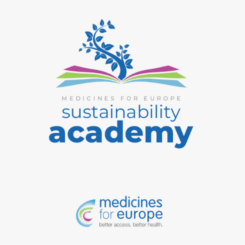



We are working to advance more sustainable practices across our sector, knowing that human health and environmental health are closely interconnected. We are committed to minimising our impact on the environment while safeguarding a reliable supply of medicine.
A dedicated Medicines for Europe Sustainability Committee helps coordinate and govern our priorities and joint efforts. Via the Medicines for Europe Sustainability Academy, available to all members, we are actively working to build awareness and support best practice sharing across our sector with the aim to support more sustainable outcomes. The priorities of the committee are to:
As part of climate change mitigation and adaptation measures, many of our members have established science-based greenhouse gas (GHG) reduction targets in support of the Paris Agreement and are working across the pharmaceutical supply chain to encourage GHG reductions beyond their own operations. We systematically monitor progress across our membership, to help drive advancement and support accountability.

In 2024, Medicines for Europe’s Sustainability Committee launched the Sustainability Academy, a virtual training and engagement forum. The Academy supports capacity-building and awareness through focused educational content, aiming to equip our sector with the tools and knowledge needed to meet evolving environmental and social expectations. The webinars are open to Medicines for Europe members, as well as national associations and their members, and are designed to foster education and experience-sharing across the network. By creating a collaborative learning space, the Academy helps to make expert input, practical case studies, and useful resources more broadly accessible across the sector.
Through these initiatives, Medicines for Europe is helping to shape a more sustainable future for medicines — one rooted in transparency, collaboration, and policy coherence. For further information or enquiries regarding the Sustainability Academy, please contact Jennyfer Vervisch, Sustainability Policy Officer, at jvervisch@medicinesforeurope.com
The Pharmaceutical Industry’s Proposal for Environmental Protection
The pharmaceutical industry is committed to environmental protection, contributing to the health and safety of future generations. We propose actions in three key areas where we have the greatest leverage:
Additionally, we are supporting public communication efforts, such as the #medsdisposal campaign, to promote responsible use and disposal of medicines.
These actionable steps demonstrate our commitment to a sustainable future. Medicines for Europe is dedicated to making the pharmaceutical sector more environmentally responsible, while ensuring access to affordable medicines. Through collaboration, science-based policy-making, and continuous improvement, we will contribute to a healthier planet and better future for all.
In addition to these specific areas for action, the pharmaceutical industry stands ready to support European and MSs communication activities and awareness raising campaigns aimed at patients and public on the appropriate use, storage and disposal of medicines. A social media campaign #medsdisposal on the appropriate disposal of medicines was launched in June 2015. This is a joint initiative between European healthcare, industry and student organisations. Further information is available at http://medsdisposal.eu/.
Medsdisposal is an online communication campaign aimed at raising public awareness on the existing collection and disposal schemes already in place in Member States, emphasizing the fact that it is everyone’s responsibility and it is easier than one may think.
Joint Press Statement of the Inter Associations Initiative (IAI) Pharmaceuticals in the Environment Task Force (AESGP, EFPIA, Medicines for Europe) – European Union Strategic Approach to Pharmaceuticals in the Environment: view here